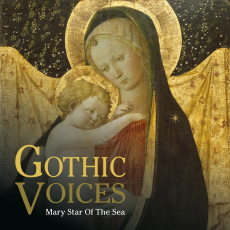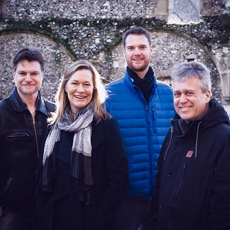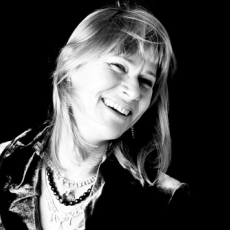Gothic Voices - Mary Star Of The Sea - MusicWeb International
For many music lovers, one of the finest recordings of
the last 50 years was the extraordinary A Feather on the Breath of God, the
legendary recording from the Gothic Voices recorded in
1981, which, for many, served as an introduction to the world of medieval
polyphony as represented by Hildegard of Bingen. This new CD is just for the
four outstanding singers of Gothic Voices, unaccompanied and unadorned (and not
the original singers from 35 years ago!). This is the first of a series for
Linn: the next will be devoted to Dufay.
This new CD is largely from later in the medieval period, principally the 13th
and 14th centuries, interspersed with recent material from Joanne
Metcalf and Andrew Smith. The focus in this CD is not a single composer but a
single theme of Marian devotion.
Not to pay attention to the context, and to listen to the CD as pure music is
to miss a little of the purpose of the programme, something which has been
obviously carefully planned. To say that is to take nothing away from the
beauty and security of the a capella singing, which is sheer
delight throughout.
It would be simple to dismiss Marian devotions as of a kind, when Mary is of
such significance in so many ways, not simply as ‘The Star of the Sea', or the
young virgin at the Annunciation but no less as the mature mother in grief at
the foot of the Cross (‘Stond wel, Moder, under rode') and the assumed Queen of
Heaven. The programme thus moves through stages from the general through to the
particular Mary on whom the believer might focus a specific meditation and
prayer.
It is the agonised grief of ‘Stond wel...' in the anonymous form, which is the
highlight of the CD - there is astonishing depth of beauty and anguish in the
simple lines of the dialogue between mother and crucified Son. The simplicity
is part of the intensity communicated. It is not often than reviewers draw
attention to the acoustic of the recording, but the effect of the ambience of
Boxgrove Priory gives a wonderful sense of background silence and timelessness.
Regardless of personal faith, the sense of loss is universal, and it is caught
to perfection here.
There are glories throughout, and the examples of modern pieces are
well-performed. I confess that I remain in two minds about these. They contain
fine moments and serve to remind us that Marian devotion is not something
confined to a distant past but a continuing and important part of faith for so
many. And yet, for myself, I think I would have preferred to have heard more
pieces from the wealth of existent material from the Middle Ages. But that does
not detract from the significance or excellence of the programme - in other
moods, I might think differently.
Just lovely!


